|
The
Olympic games were first recorded in 776 BC, they
originated at least a century before that and possibly as early as the
13th century BC. We've come a long way since then. Now digital clocks
time athletes to hundredths of a second and cameras record every wince.
London was selected as the host city on 6 July 2005 during the 117th IOC Session in
Singapore, defeating Moscow, New York City, Madrid and
Paris. London will become the first city to officially host the modern Olympic Games three
times, having previously done so in 1908 and in 1948.
While budgetary considerations for the games have generated some
criticism, they have also been welcomed by others as having prompted a redevelopment of many of the areas of London in which events are to be held – particularly themed towards
sustainability. The main focus of the games will be a new 200 hectare Olympic Park, constructed on a former industrial site at Stratford in the east of
London. The Games also make use of many venues which were already in place before the bid.
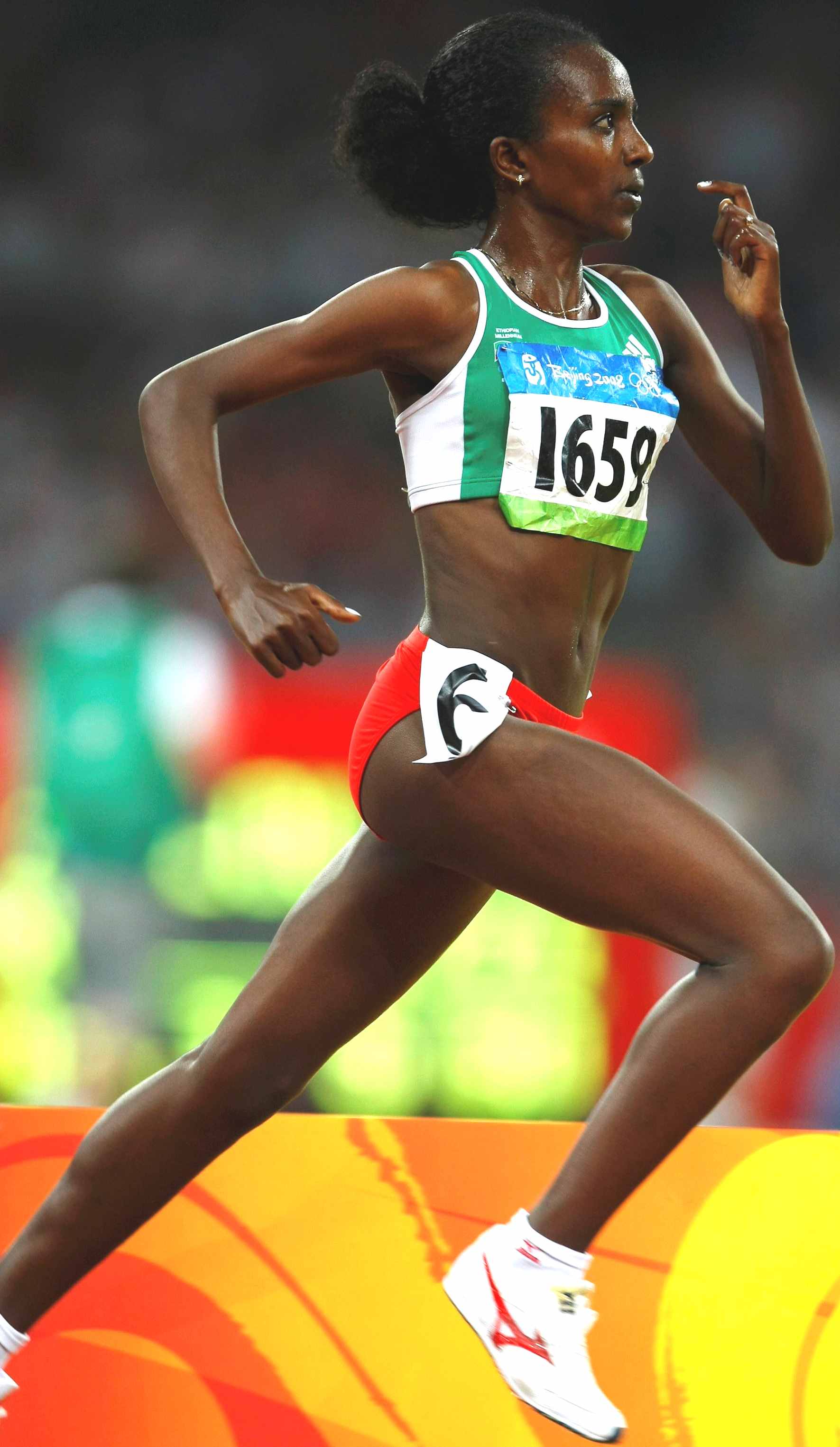
Olympic Games
- ladies runner Tirunesh Dibaba, Ethiopia
Bids for the 2012 Summer Olympics
A London 2012 Olympics banner at The Monument in London.By the bid submission deadline of 15 July 2003, nine cities had submitted bids to host the 2012 Olympics. These cities were Havana, Istanbul, Leipzig, London, Madrid, Moscow, New York City, Paris and Rio de
Janeiro.
The Mayor of London Ken Livingstone noted his primary motivation to initiate and lobby for the city's bid as to develop the east end of London, neglected for over thirty
years. On 18 May 2004, the International Olympic Committee (IOC), as a result of a scored technical evaluation, reduced the number of cities to five: London, Madrid, Moscow, New York, and
Paris.
All five cities submitted their candidate file by 19 November 2004, and were visited by the IOC inspection team during February and March 2005. The
Paris bid suffered two setbacks during the IOC inspection visit: a number of strikes and demonstrations coinciding with the visits and a report coming out that one of the key members of the Paris bid team would face charges over alleged corrupt party political
finances.
On 6 June 2005, the IOC released its evaluation reports for the five candidate cities. Although these reports did not contain any scores or rankings, the evaluation report for Paris was considered the most positive, now followed closely by London which had narrowed down most of the gap observed by the initial evaluation in 2004 regarding Paris. Also New York and Madrid obtained very positive evaluation
reports.
Throughout the process, Paris was widely seen as the favourite to win the nomination, particularly as this was its third bid in recent history. Originally London was seen lagging Paris by considerable margin; however, this started to improve with the appointment of Sebastian Coe as new head of London 2012 on 19 May
2004. In late August 2004, some reports started emerging predicting a London and Paris tie in the 2012
bid. In the final run-up to the 117th IOC Session, London and Paris appeared to be increasingly in a neck-and-neck race. On 1 July 2005, Jacques Rogge, when asked who the winner would be, told the assembled press: "I cannot predict it since I don't know how the IOC members will vote. But my gut feeling tells me that it will be very close. Perhaps it will come down to a difference of say ten votes, or maybe
less".
On 6 July 2005, the final selection was announced at the 117th IOC Session in
Singapore. Moscow was the first city to be eliminated, followed by
New York and Madrid. The final two cities left in contention were London and Paris. At the end of the fourth round of voting, London won the right to host the 2012 Games with 54 votes, defeating Paris's
50. The celebrations in London were short-lived, being overshadowed by terrorist attacks on London's transport system less than 24 hours after the
announcement.
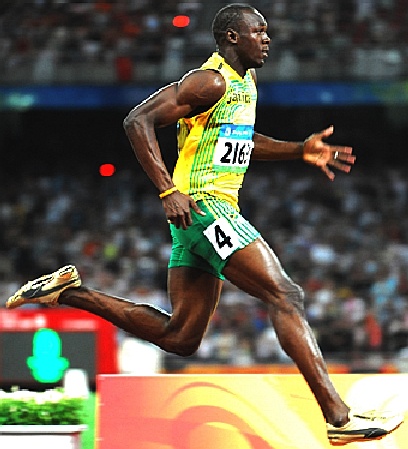
Olympic Games
- men's 100 meters, Usain Bolt - the world's fastest man
2012 Summer Olympics bidding results
City - NOC - Round 1 - Round 2 - Round 3 - Round 4
London United Kingdom 22
- 27 - 39 - 54
Paris
France 21 - 25 - 33 - 50
Madrid
Spain 20 - 32 - 31 —
New York City United States 19
- 16 — —
Moscow
Russia 15 — — —
Development and preparation
2012 Summer Olympic development
The London Organising Committee of the Olympic Games (LOCOG) was created to oversee the staging of the Games after the success of the bid, and held their first board meeting on 3 October
2005. The committee, chaired by Lord Coe, is in charge of implementing and staging the games, while the Olympic Delivery Authority (ODA) is in charge of the construction of the venues and
infrastructure. In April 2006 the Olympic Delivery Authority board was
established.
The Government Olympic Executive (GOE), a unit within the Department for Culture, Media and Sport (DCMS), is the lead Government body for coordinating the London 2012
Olympics. The GOE reports through the DCMS Permanent Secretary to the Minister for Sports and the Olympics. It focuses on oversight of the Games, cross-programme programme management and the London 2012 Olympic Legacy before and after the Games that will benefit London and the UK. The organisation is also responsible for the supervision of the £9.3 billion of public sector
funding.
In August 2011, security concerns arose surrounding the hosting of the Olympic Games in
London due to the 2011 England riots, with a few countries expressing fear over the safety of the
Games, in spite of the International Olympic Committee's assurance that the riots will not affect the
Games.
The IOC's Coordination Commission for the 2012 Games completed their tenth and final visit to London in March 2012. They concluded that "London is ready to host the world this
summer".
Venues and infrastructureMain article: Venues of the 2012 Summer Olympics and Paralympics
Olympic Stadium in June 2011The 2012 Olympic and Paralympic Games will use a mixture of new venues, existing and historic facilities, and temporary facilities, some of them in well-known locations such as Hyde Park and Horse Guards Parade. Some of the new facilities will be reused in their Olympic form, while others will be resized or
relocated.
The majority of venues have been divided into three zones within Greater London: the Olympic Zone, the River Zone and the Central Zone. In addition to these are those venues that, by necessity, are outside the boundaries of Greater London, such as the Weymouth and Portland National Sailing Academy on the Isle of Portland in Dorset which will host the sailing events, some 125 miles (200 km) southwest of the Olympic Park. The football tournament will be staged at several grounds around the
UK. Work began on the Park in December 2006 when a sports hall in Eton Manor was pulled
down. The athletes' village in Portland was completed in September 2011.
In November 2004 the 500 acre Olympic Park plans were revealed. The plans for the site were passed in September 2004 by Tower Hamlets, Newham, Hackney and Waltham
Forest. The redevelopment of the area to build the Olympic Park required compulsory purchase orders of property. The London Development Agency and the London and Continental Railways had a dispute about the orders in November 2005. The LCR accused the LDA of killing off development in the area. The LDA planned alongside the Olympic Park to buy land for the Stratford City development project, which the 180-acre site of the former Stratford Rail Lands into a mixed-use development, including 4,500 new homes, office space, hotels and
shops. This resulted in 2011 with the completion of the largest urban shopping centre in
Europe being operated by
Westfield. By May 2006 86% of the land had been bought as businesses fought eviction; this led to an enquiry being set up. 206 companies had to relocate by July
2007. In addition, residents who opposed the eviction tried to find way to stop it by setting up campaigns. However they had to leave as 94% of land was bought and the other 6% bought as a £9 billion regeneration project
started.
However, there were some issues with the original venues not being challenging enough or being financially unviable. For example, the road racing at the Olympic Games was originally scheduled to take place in Regent's Park and on Hampstead Heath. Instead the Olympic road races will start and finish on The Mall in central London, extend into Surrey to the south and include loops around Box
Hill. The Olympic mountain bike event will take place at Hadleigh Farm after the event was moved from Weald Country
Park, after the UCI labelled the course at the park "too easy" in July
2008. A location in Kent was also considered.
The Olympic marathon course, which was set to finish in the Olympic stadium, was moved to The
Mall.The idea angered some members of the local community, stating that they had been left out of the Olympics as no events would take place in the boroughs. The change was made as closing Tower bridge would cause "gridlock" to
London. North Greenwich Arena 2 was scrapped in a cost-cutting exercise, with Wembley Arena being used for badminton and rhythmic gymnastics events
instead.
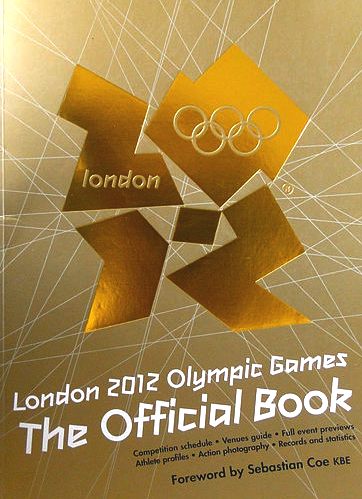
Public transport
The Olympic Javelin serviceLondon's public transport was an element of the bid which was scored poorly in the IOC's initial evaluation; however, they felt that if the improvements were delivered in time for the Games then London would
cope. Transport for London (TfL) carried out numerous improvements in preparation for 2012, including the expansion of the London Overground's East London Line, upgrades to the Docklands Light Railway and the North London
Line, and the introduction of a new "Javelin" high-speed rail service, using the Hitachi Corporation's "bullet"
trains. The platforms at Stratford International station (which are at a height designed for Eurostar trains) will be temporarily raised to accommodate the Javelin
trains. According to network rail an additional 4,000 train services will run during the Games, with train operators putting on longer trains during the
day.
TfL also propose the construction of a £25 million cable car across the River Thames, the "Thames Gateway Cable Car", to link 2012 Olympics
venues. It will cross the Thames river between Greenwich Peninsula and the Royal Docks, carrying up to 2,500 passengers an hour at a heights above 50 metres in the air. It is designed to cut journey times between the O2 arena and the ExCel exhibition centre – both of which are Olympic locations. The system could provide a crossing every 30
seconds.
The plan is to have 80% of athletes travel less than 20 minutes to their
event and to have 93% of athletes within 30 minutes of their event. The Olympic Park would be served by ten separate railway lines with a combined capacity of 240,000 passengers per
hour. In addition the LOCOG planned for 90% of the venues to be served by three or more types of public
transport. Two park-and-ride sites were off the M25 with a combined capacity of 12,000 cars 25 minutes away from the Olympic Park. Another park and ride site was planned in Ebbsfleet which would have capacity for 9,000 cars where spectators could board a 10 minute shuttle
bus. To get spectators to Eton Dorney, four park and ride schemes were set up. Spectators would be dropped off at Windsor Racecourse with a bridge going over the Thames linking the racecourse to the rowing
venue.
A London Underground train decorated to promote London's Olympic bid – this coincided with plans for investment in the city's public transport networkSome lanes on some roads in London will be dedicated to athletes, officials and
VIPs.
Concerns have been expressed at the logistics of spectators travelling to the events outside London. In particular, the sailing events at Portland are in an area without direct motorway connection, and with local roads that are heavily congested by tourist traffic in the
summer. However the Weymouth area did undergo a major upgrade on its road infrastructure. A £77 million relief road connecting Weymouth to Dorchester was built and opened in
2011. Some £16 million was put aside for the rest of the improvements. In addition the plans removed 5 roundabouts to ease congestion and replaced them with traffic
lights. But some residents were unhappy that the roundabouts were
removed.
FirstGroup will provide the venue shuttle and park and ride services, services connecting peripheral park and ride sites on the M25 with the Olympic Park and Ebbsfleet, and a nationwide network of express coaches to the Olympic Park and the Weymouth and Portland sailing venue. The services will require around 900 vehicles in total, although some will be
sub-contracted.
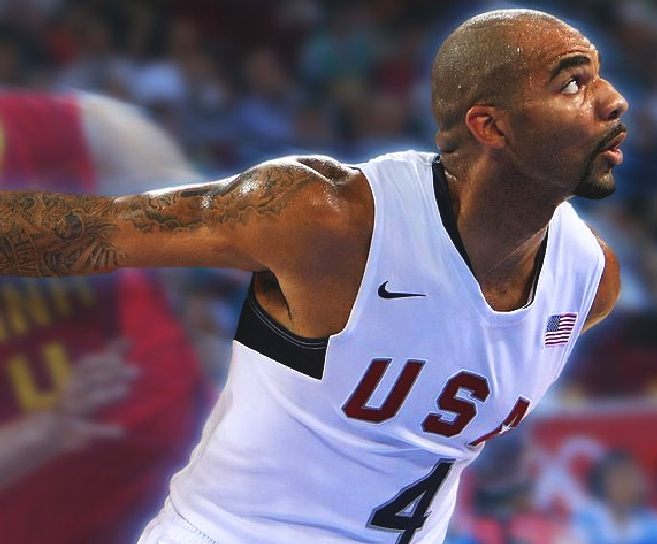
Financing
The specific problem is: Public and private funding need to be separated more clearly. Comparisons with the original budget are missing. Section contains outdated figures and is generally hard to understand for non-business people.. Please help improve this article if you can; the talk page may contain suggestions. (May 2012)
The costs of mounting the Games are separate from those for building the venues and infrastructure, and redeveloping the land for the Olympic Park. While the Games are privately funded, the venues and Park costs are met largely by public money.
On 15 March 2007, Tessa Jowell announced to the House of Commons a budget of £5.3 billion to cover building the venues and infrastructure for the Games, at the same time announcing the wider regeneration budget for the Lower Lea Valley budget at £1.7 billion.
On top of this, she announced various other costs including an overall additional contingency fund of £2.7 billion, security and policing costs of £600 million, VAT of £800 million and elite sport and Paralympic funding of nearly £400 million. According to these figures, the total for the Games and the regeneration of the East London area, is £9.345 billion. Then Mayor Ken Livingstone pledged the Games Organising Committee would make a
profit.
The costs for staging the Games (£2 billion) are funded from the private sector by a combination of sponsorship, merchandising, ticketing and broadcast rights. This budget is raised and managed by the London 2012 Organising Committee. According to Games organisers, the funding for this budget broadly breaks down as:
64% from Central Government;
23% from National Lottery
13% from the Mayor of London and the London Development Agency
On 18 August 2007, The
Belfast Telegraph reported that jubilation over winning the right to stage the Olympic Games was becoming more muted as realisation dawns on the public of the enormous costs involved in creating facilities for the
athletes. Grassroot sport cuts will fund the Olympics, government figures suggested on 19 August
2007.
In November 2007, Edward Leigh MP, criticised the organisers for significantly under-estimating the cost of staging the games, suggesting they had either "acted in bad faith or were
incompetent".
On 10 December 2007, Tessa Jowell announced confirmation of the budget announced earlier in 2007. In June 2007, the Ministerial Funders’ Group (established to manage the allocation of contingency to the ODA within the overall budget) met and agreed a first allocation of contingency to the ODA, being £360 million out of the £500 million of initial contingency announced in March, to enable the ODA to manage early cost pressures.
Following its second meeting on 26 November 2007, the Funders’ Group has now agreed a baseline budget and scope proposed by the ODA. The total budgeted base cost to be met by the public sector funding package remains at £6.090 billion including tax and excluding general programme contingency as announced in March. This includes the allocation to the ODA of the remaining £140 million from the initial £500 million contingency announced in
March.
There have, however, been concerns over how the Olympics are to be funded. In February 2008, a London Assembly culture and sport committee report expressed concerns over the funding of the games taking away money from London's sports and arts
groups. There have also been complaints that funding towards the Olympics has been to the detriment of funding other areas of the UK. In
Wales, there has been criticism from Plaid Cymru about the games depriving Wales of money, by using UK-wide funding rather than English
funding. The Wales on Sunday newspaper claimed former UK Prime Minister Tony Blair broke his promise to not use National Lottery funding for the Olympic
games.
As at December 2009, the Delivery Authority had allocated £702 million of Programme and Funders’ contingency, largely to cover the decisions to publicly fund the Village and Media Centre after it became clear private funding could not be secured on acceptable terms during the 2008 to 2010 economic crisis. According to the Government Olympic Executive and Olympic Delivery Authority risk assessments the remaining £1,270 million contingency is sufficient to manage risks to the Delivery Authority’s programme.
Also from May 2010, the Olympic budget will be cut by £27 million as part of the £6.2 billion cuts by the new
Conservative-Liberal coalition government.
On 19 July 2011, Hugh Robertson, Sports & Olympic Minister, revealed that he expected the project to be delivered on time and under budget. "With one year to go to London 2012, the Games construction is 88 per cent complete and ahead of time and under budget. That is an extraordinary thing for a Government Minister to be able to say a year out from the
Games."
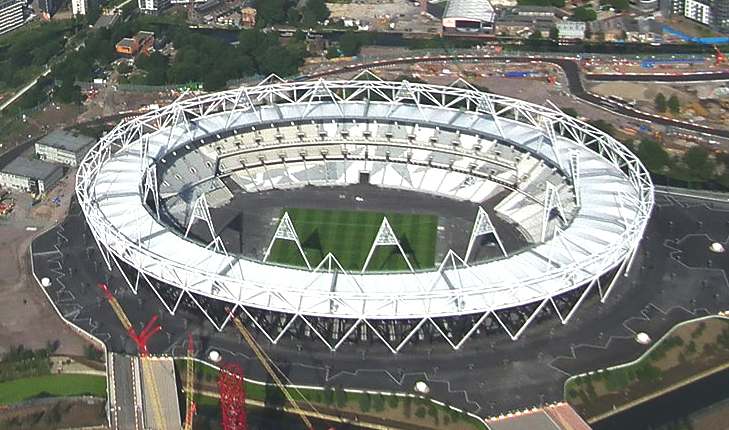
Olympic
Stadium, London Park
Partners - Sponsors of the 2012 Olympic Games
Worldwide partners:
Acer
Atos
Coca-Cola
DOW
General
Electric
McDonald's
Omega
SA
Panasonic
Procter &
Gamble
Samsung
VISA
Official partners:
Adidas
BMW
BP
British Airways
BT
EDF
Energy
Lloyds
TSB
Official supporters:
Adecco
Arcelor
Mittal
Cadbury
Cisco Systems
Deloitte
Thomas Cook
Group
United Parcel Service (UPS)
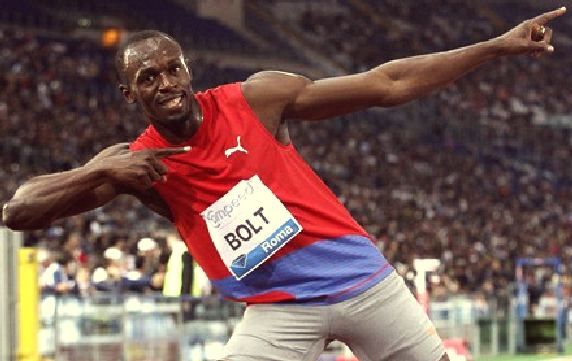
Usain Bolt, the world's fastest male sprinter 2012
Official suppliers and providers:
Aggreko
Airwave
Atkins
Boston Consulting
Group
CBS
Outdoor
Crystal CGEurostar
Freshfields
Bruckhaus
Deringer
LLPG4S
GlaxoSmithKline
Gymnova
Heathrow
Airport
Heineken
UK
Holiday Inn
John
Lewis
McCann
Worldgroup
Mondo
Nature
Valley
Next
The Nielsen
Company
Populous Rapiscan
Systems
Rio
TintoTechnogym
Thames
Water
Ticketmaster
Trebor
Westfield
To help fund the cost of staging the games the London Olympic organisers have agreed partnership deals with major companies. The companies have signed up into four categories; worldwide, tier one, tier two and tier three.
VolunteersUnpaid volunteers known as Games Makers will perform a variety of tasks before and during the Games.
A target of 70,000 volunteers was set as early as 2004. When recruitment took place in 2010 over 240,000 applications were
received. Sebastian Coe said in February 2012 "Our Games Makers will contribute a total of around eight million volunteer hours during the Games and the Games simply wouldn't happen without
them".
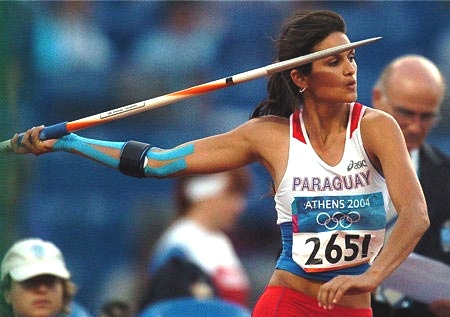
Olympic Games
- 2004 Athens, javelin, Leryn Franco
Ticketing
Organisers estimate that some 8 million tickets would be available for the Olympic Games, and 1.5 million tickets for the Paralympic
Games. It is estimated that 82% of available Olympic tickets and 63% of Paralympic tickets will be sold. LOCOG aims to raise £375–£400 million in ticket sales. There will also be free events: for example, the marathon, triathlon and road
cycling, though for the first time in Olympic history, the sailing events will be
ticketed. Tickets for the London Prepares series, the Olympic test events, started to go on sale in May
2011. To reduce congestion, ticket holders are entitled to free use of London's public transportation network on the day of the
event.
Following IOC rules, people applied for tickets from the NOC of their country of residence.
European Union residents were able to apply for tickets in any EU
country.
In Great Britain, ticket prices range from £20 for many events to £2,012 for the most expensive seats at the opening ceremony. Free tickets were given to military personnel, and children were invited to 'win'
tickets. Free tickets were also given to the survivors and families of those who died during 7 July 2005 London
bombings. Initially, people were able to apply for tickets via a website from 15 March 2011 until 26 April 2011. There was a huge demand for tickets, with 1.8 million people applying for 20 million tickets – three times the 6.6 million tickets available in the first round lot, with 95% of the applications from Great Britain. More than 50% of the sessions went to a random
ballot. Over half the people who applied got no tickets, and the process was widely criticised, with a consumer group questioning the point of taking money out of people's bank accounts before they knew which tickets they had successfully
purchased, and triple Olympic Champion Bradley Wiggins labeling the process a
shambles. However, Lord Coe and the LOCOG insisted that the process was fair, and that there was no 'perfect'
system.
There was a second round of ticket sales for events that failed to sell out in the initial
allocation. This took place over a 10-day period between the 23 June and 3 July 2011, with priority given to those who were unsuccessful in the first allocation process. At this point there were about 1.7 million tickets for football and 600,000 for other sports, including archery, hockey, football, judo, boxing and volleyball, among other sports with 1.5 million tickets priced between £20 and £50. Unfortunately due to the amount of people buying tickets and because the Ticketmaster website did not update immediately, 15,000 had their application rejected, but 90% of people did get some tickets; as some events sold out in 15 minutes and by 8 am 10 sports had sold
out. People who were successful in the first round of tickets were allowed to buy more during the period 8–17 July 2011. By this point 1.5 million tickets were available for football, 40,000 for Volleyball and 8,000 for freestyle wrestling on a first come first served basis. However by 10 July all the tickets for Volleyball had been sold, as 3.5 million tickets had been sold in total. Another round of tickets was promised to go on sale in
2012.
In Russia people bought "Olympic vouchers" which one would have to redeem in London during July and August 2012, with people making their own accommodation and travel
arrangements. In Brazil, the ticket website and payment system did not work properly for the first three and a half
days. And the British government was asked to explain why it bought 9,000
tickets.
Nearly one million more tickets are set to go on sale starting on 11 May
2012.
Countdown
During the closing ceremony of the 2008 Olympics, the Olympic Flag was formally handed over from the Mayor of Beijing to the Mayor of London. This was followed by a section highlighting
London, One month later, the Olympic and Paralympic flags were raised outside the London City
Hall.
Countdown clock in Trafalgar SquareA countdown clock in Trafalgar Square was unveiled, 500 days before the
games. The same location hosted one of a number of events to mark a year before the
games. Final countdown to the start of this year's summer games in London has begun with the ceremony of lighting of Olympic flame in Ancient Olympia in
Greece.
Security for the 2012 Summer Olympics
The security operation is led by the police, with 10,000 officers available, supported by 13,500 members of the armed forces. Naval and air assets, including ships situated in the Thames,
Eurofighter jets and surface-to-air missiles, will be deployed as part of the security operation. The cost of security has also increased from £282m to £553m. This will be the biggest security operation Britain has faced for decades. The figure of 13,500 armed forces personnel is more than Britain currently has deployed in
Afghanistan. The Metropolitan Police and the Royal Marines performed security exercises in preparation for the Olympics on 19 January 2012, with 50 marine police officers in rigid inflatables and fast response boats, joined by up to 100 military personnel and a Lynx Navy
helicopter.
The Ministry of Defence distributed leaflets to residents of the Lexington building in Bow, announcing that a missile system was to be stationed on top of the water
tower. This caused concern to some residents. The Ministry said that probably would use Starstreak missiles and that site evaluations had taken place, but that no final decision had taken
place.
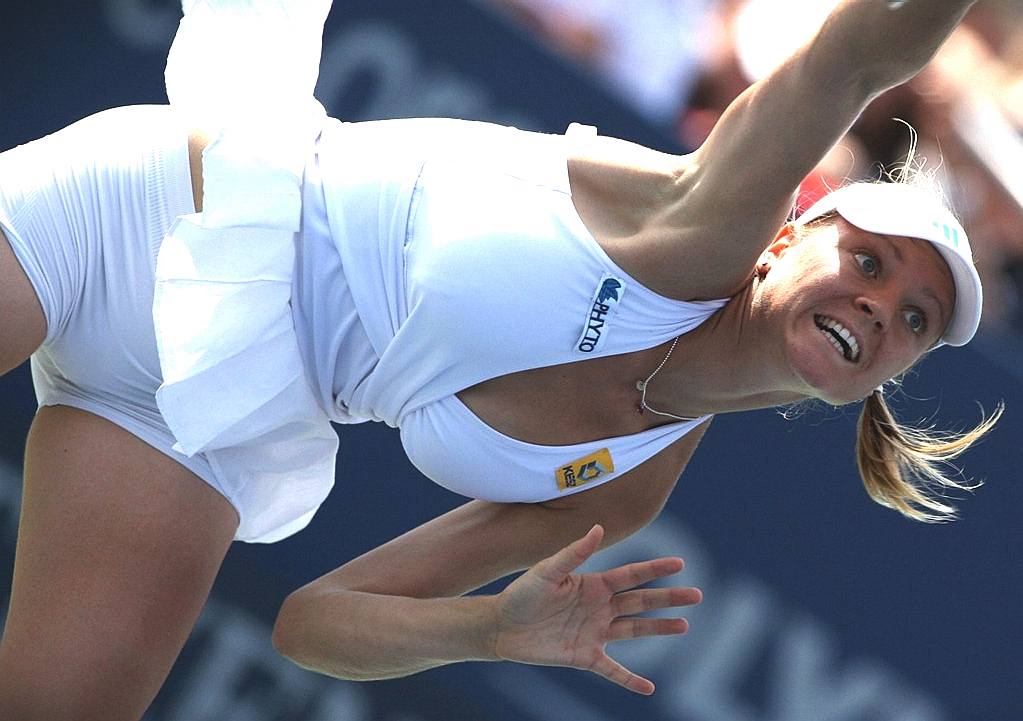
Logo
There have been two London 2012 logos: one for the bidding process created by Kino Design and a second as the brand for the Games themselves. The former is a ribbon with blue, yellow, black, green, and red stripes winding through the text "LONDON 2012," making the shape of the River Thames in East London. The latter, designed by Wolff Olins, was unveiled on 4 June 2007 and cost £400,000. This new logo is a representation of the number 2012, with the Olympic Rings embedded within the
zero.
The Paralympics logo (far left) and the different official colour combinations for the Wolff Olins main logo designThis will be the first time that the same essential logo is to be used for both the Olympic and Paralympic
games.
The standard colours are green, magenta, orange and blue; however the logo has incorporated a variety of colours, including the Union Flag to promote the handover
ceremony. The flexibility of the logo has also enabled sponsors to incorporate their corporate colours into a personalised version, such as Lloyds
TSB, British Airways, and Adidas.
London 2012 has stated that the new logo is aimed at reaching young people. Sebastian Coe stated that it builds upon everything that the organising committee has said "about reaching out and engaging young people, which is where our challenge is over the next five years." One observer, a managing director of an advertising agency, noted that the logo bore a strong resemblance to the logo for the 1974–1982 children's television programme Tiswas, commenting that appealing to young people is difficult, and that they will see right through attempts to patronise
them.
Early public reaction to the logo, as measured by a poll on the BBC website, was largely negative: more than 80% of votes gave the logo the lowest possible
rating. Several newspapers have run their own logo competitions, displaying alternative submissions from their readers. The Sun displayed a design by a macaque
monkey. It was suggested that the logo resembles the cartoon character Lisa Simpson performing
fellatio and others have complained that it looks like a distorted
Swastika. In February 2011, Iran complained that the logo appeared to spell out the word "Zion" and threatened to boycott the
Olympics. Iran submitted its complaint to the International Olympic Committee, describing the logo as "racist", asking that it be withdrawn and the designers be "confronted". The IOC "quietly" rejected the demands, and Iran announced it would not boycott the
Games.
A segment of animated footage released at the same time as the logo was reported to trigger seizures in a small number of people with photosensitive epilepsy. The charity Epilepsy Action received telephone calls from people who had had seizures after watching the sequence on TV. In response, a short segment was removed from the London 2012
website. Ken Livingstone, then London Mayor, said that the company who designed the film should not be paid for what he called a "catastrophic
mistake."
A blogger at the BBC said that "London 2012's new logo has got the country talking [although] not in the manner the organisers would have
hoped." One employee at a design firm described it as "well thought out" and anticipated it would "become a source of pride for London and the
Games."
MascotsMain article: Wenlock and Mandeville
Wenlock and MandevilleThe official mascots for the 2012 Summer Olympic and Paralympic Games were unveiled on 19 May
2010; this marks the second time (after Vancouver) that both Olympic and Paralympic mascots were unveiled at the same time. Wenlock and Mandeville are animations depicting two drops of steel from a steelworks in
Bolton. They are named Wenlock, after the Shropshire town of Much Wenlock, which held a forerunner of the current Olympic Games, and Mandeville, after Stoke Mandeville, a village in Buckinghamshire where a forerunner to the Paralympic Games were first
held. The writer Michael Morpurgo wrote the story concept to the mascots, and an animation was
produced; it is intended that this will form part of an ongoing series concerning the mascots in the run-up to the Games in
2012. Two stories have been created about the mascots: Out Of A Rainbow, the story of how Wenlock and Mandeville came to be, and Adventures On A Rainbow, which features the children from Out Of A Rainbow meeting the mascots and trying out many different Olympic and Paralympic
sports.
Olympic
Games - Lighting the Torch - Youtube
Medals
Front and reverse view of the 2012 Summer Olympics gold medalA total of around
4,700 medals for the Olympic and Paralympic Games have been produced by the Royal
Mint. The medal, designed by David Watkins, weighs 375–400g and is 7mm thick, with the sport and discipline engraved on the rim. Following recent tradition, the front of the medal features Nike, the Greek goddess of victory, stepping from Parthenon. The reverse side features has the Games logo, the River Thames, and a series of lines symbolising the energy of the
athletes.
Test events - London Prepares series
Many test events will be held throughout 2011 and 2012, either through an existing championship such as 2012 Wimbledon Championships or as a specially created event held under the banner of London Prepares. Some events are closed to the public, others are ticketed. Basketball and BMX were the first events to be tested within the Olympic
Park.
Torch relay - 2012 Summer Olympics torch relay
The 2012 Olympics torchThe Olympics torch relay runs from 19 May – 27 July, prior to the games. Plans for the relay were developed in 2010–11, with the torch bearer selection process announced on 18 May
2011. The Olympic Torch arrived on flight BA2012 on 18 May 2012 from
Greece. The relay will last 70 days, with 66 evening celebrations, six island visits with about 8,000 people carrying the torch a distance of about 8,000 miles (12,800 km), starting from Land's End in
Cornwall. The torch will have one day outside of the United Kingdom when it will visit Dublin on 6
June. The relay is focusing on: National Heritage Sites, locations and venues with sporting significance, key sporting events, schools registered with the Get Set School Network, green spaces and biodiversity, Live Sites (city locations with large screens), festivals and other
events.
Opening ceremonyThe Opening ceremony of the 2012 Summer Olympics will be called 'The Isles of
Wonder’. Oscar-winning director Danny Boyle will be the artistic director for the opening ceremony.
It was confirmed in February that Queen Elizabeth II and the Duke of Edinburgh will officially open the games at the opening
ceremony. A short film starring Daniel Craig as secret agent James Bond will be screened during the television coverage of the
ceremony.
Olympic
Games - Proctor - Ariel 2012 - Youtube
A
- Z SPORTS INDEX
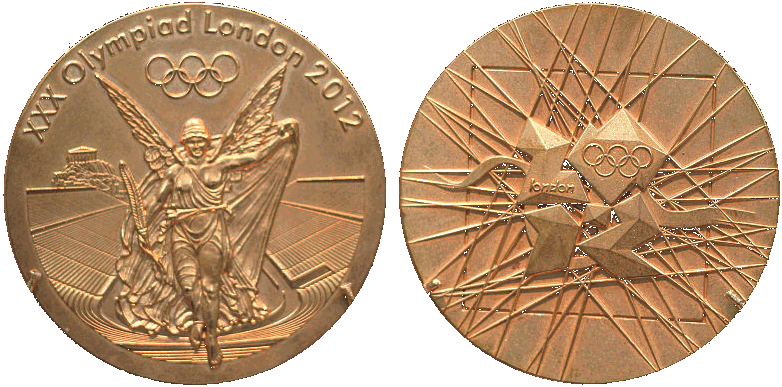
Click
on the medals to see the Olympic Gold Medal Winners for 2012
LINKS
:
CONTACT
INFORMATION
Gold
medal formula

Super
human speed and strength, the Nazi dream for a master race is about to
come true .........
|








